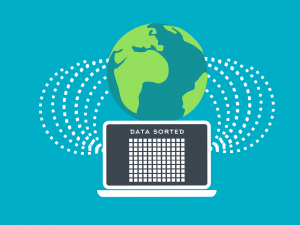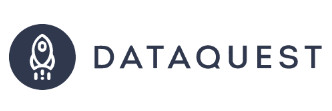Disclosure: Privacy Australia is community-supported. We may earn a commission when you buy a VPN through one of our links. Learn more.
Best Data Science Courses & Certifications Online

Most people will find their start in office work doing data entry jobs. These jobs have their advantages and their drawbacks.
The main advantage is that you can essentially turn your brain off for them.
If most of what you are doing really is just moving data from a piece of paper to software, then the process is more mechanical than it is intellectual.
While many people hold data entry jobs as a temporary measure while pursuing other careers, the people who can develop the skill of understanding that data have a new field open to them: Data science. This is the field of analysing and applying that data to business decisions and products.
Of course, this is quite a complex task. And even worse, it is not the kind of job that you are going to hear a lot about outside the workplace. A data scientist does not have the same marketability as jobs like astronaut or race car driver.
And if you already have a job, how are you supposed to find the time to get educated on a whole new field of employment?
The answer to that question is online courses. Online courses are designed around professionals who need to be able to pick their own class times and have their own schedules.
Table of Contents:
- What Do You Need to Bring to an Online Course
- Best Data Science Courses and Certifications Online
- Things to do Before Getting a Job
What Do You Need to Bring to an Online Course? 🖥️

But as convenient as online courses are, they are not a free and easy ticket to higher employment. You have to be prepared just like you would be for pursuing any traditional form of higher education.
While a university expects you to have a dozen notebooks and thousands of dollars of textbooks, online courses require you to bring something more internal. Let’s go over what you need for an online course.
Knowing What you are Trying to Learn 👨🏫️👩🏫️
This is particularly meaningful with data science. It benefits you greatly to know as much about the sorts of jobs you can get with your education as you can. This does not just mean who is hiring and what their job postings say. You will also want to know what kind of data they are working with, and how.
This will help you figure out where you want to learn from, and what sorts of lessons will benefit you the most. And when you know what kind of work you are going to do, then the resources you establish during your education can also become resources for when you enter the industry as well.
Knowing What Your Limits Are 🏋️
It is not easy to recognize your own limits. There are so many forces and voices in the world that will tell you that you should swagger around acting like you have no limits at all times. Well, this might put on a good show in job interviews, but you should always be aware of what your actual limiting factors are.
There are 24 hours in the day, and those 24 hours treat everyone differently. If you have external obligations that are more important than your classes, then you need to recognize that and plan your classes around that. If you have financial limitations or attention span problems, recognize those.
Basically, know how much you can take on.
Knowing What Your Goals Are 🥅️
This is slightly different than knowing what you are trying to learn. What you are trying to learn is the means. Your goals are the ends. And if you do not know the ends, then you cannot know the means.
Most people’s goals are either material or ideological. Material goals are things like “living in a good city” or “having a big salary”. Ideological goals are things like “making a product I like” or “doing work that helps people”. None of these is better than the others. But they are all very different.
Know your goals, know what you need to learn to get there, and know your ability to get there.
After you know all three of these things, then attaining what you want is just a matter of time.
With that out of the way, let’s look at some of the best data science courses you can get online.
| Providers | Best For |
|---|---|
| 1. Udemy | Best Data Science Bootcamp |
| 2. Harvard University | Best Data Science Online Course |
| 3. Coursera | Best Diverse Courses |
| 4. Metis | Best Beginner Course |
| 5. Dataquest | Best Supplemental Lessons |
1. The Data Science Course via Udemy – Best Data Science Bootcamp
While Udemy itself is well worth your time, this is easily the data science course that stands out the most. A “bootcamp” is a style of online course that is meant to be fast and difficult.
This means that it has a lot of appeal to people who are already working in another field or an adjacent field.

The reason for this comes down to scheduling. A university-level course could require you to dedicate twelve hours per week or more to your studies, not including time for studying and working outside of class. A bootcamp, however, will usually take no more than five hours per week even with studying.
Those five hours will be incredibly intense, direct, and usually taught by an industry professional. The work will also reflect the challenges you will actually face in the industry, meaning that the skills will transfer over pretty directly. And best of all, its schedule extends outside normal work hours.
The certification is not necessarily the focus of the course, though it does come with one. Many employers are familiar enough with people getting their education through Udemy that even though it is not technically accredited, it still carries with it a degree of credibility.
All of this makes it great for professionals, though as mentioned before it will likely be hard on you. The thing about bootcamps is that they are meant to help people push past plateaus in their skills. That means you have to show up with a degree of fundamentals to begin with.
Drawbacks 👎️
This leads us nicely to the problems with the bootcamps in general. The course is not free, and it does not ramp up slowly as most courses do. It hits hard and fast, and you will be left behind if you cannot keep up. This is a problem if you end up failing since you have to pay either way.
We usually do not mind if a course is difficult. Difficult courses usually come with the upside of being highly educational, which this one is. But in this case, it is worth remarking upon. It is a perfect example of needing to know what your goals and limitations are before you commit time and money to a class.
In short, this probably should not be your first data science course. It is advanced and rigorous and requires pre-existing knowledge of the field. Luckily, Udemy is a large enough platform that you can usually find the prerequisites of a course there. Start smaller and work your way up to this one.
Pros
- Professional instructors that can provide good connections and career advice
- Real world object lessons so you can really understand the industry
- Does not take up much of the week, making it great for anyone with limited time on their hands
Cons
- Difficult and requires prerequisites
2. Harvard University – Best Data Science Online Course
Most people are going to see Harvard listed as the best course and say something along the lines of, “Yes, we know Harvard is a good school. But we can’t get admitted and couldn’t afford it if we did.”
Well, the Harvard data science course is actually available for free. You can get it through edX, an online school provider that links together dozens of high-level universities for free. There are over 20 free data science courses currently.

This is not well-publicised, but it is the way that many people go about developing new skills for their careers.
So, Harvard’s data science course is free and online. What does it offer you? The first thing you will want to hear is that it teaches you what are called “foundational R programming skills”.
This is the programming language that data scientists use for collating and analysing data. It is in use through about 65% of the data science industry. In short, it is one of the most important skills to learn, and most places that teach it to charge a heavy fee for certification. But not this online course.
The course is long and tough, but that is to be expected from such a prestigious school. It means that it will prepare you to really work in the industry. That toughness is also part of the reason why the certification it gives you is accredited. Not every online class has such accreditation.
Drawbacks 👎️
It is easy enough to flex that this course is taught by Harvard, but that strength can also be a weakness. Anyone who is working their own job will find it difficult to keep up with the workload and pace of the course. Essentially, it is meant for people who can dedicate themselves to it full-time.
It is intensive both in the micro sense, meaning that it takes up a lot of your time during the day, and in the macro sense. This means it takes many months for those long days to end. This contributes to its legitimacy, but it also means that not everyone is going to be able to take it.
Pros
- Taught by good professors from a prestigious school
- Gives you a rigorous education in the fundamentals of the industry’s skills
- Accredited and recognizable, giving the certification a lot of legitimacy
Cons
- Full-time
3. Coursera – Best Diverse Courses
Coursera is one of the biggest providers of online courses in the world, pulling in lessons from a huge number of different educational institutions in multiple languages.
These institutions range from vocational schools to huge universities. While we could point to one particular course, it is better to recommend the whole site.

Why is that? Well, every individual course is designed to take you from knowing nothing about the industry to be able to land a job in the industry. This is what is known as a “zero to hero” course.
That means that most of the courses on Coursera are going to be equally good at getting you a job in data science. But the real special thing about Coursera is that exact diversity. If one course is not teaching those R programming skills, then you can easily find another one that does.
But that logic extends into your assignments, and even into your career as well. If you run into a problem, then you can probably find the solution on Coursera. It is free, huge, and easy to search.
Drawbacks 👎️
The biggest issue with Coursera is the matter of certification. While most institutions that teach through Coursera are accredited, not all of them are. This can be quite the hurdle to overcome, as it means that you might get the skills, but have trouble communicating them to a prospective employer.
There are some jobs that require a portfolio of work to get a job, while others will have employers actively test your skills to see if you have the fundamental ability to do a job. With data science, your credentials carry a lot of weight. They do the job of telling your employer what you can do.
Be sure that the course you take on Coursera is giving you the kind of certification you need. You do not want to have to go back and try to get your credits transferred to a different course should their accreditation turn out to be unsatisfactory to an employer. But also, remember that some employers view accreditation and certification differently, particularly employers outside the data science industry.
Pros
- Huge selection of courses
- Everything comes from a high-level institution or university
Cons
- Not all institutions will be recognized in all countries or jobs
4. Introduction to Data Science via Metis – Best Beginner Course
For someone first starting out in learning data science, a live instructor is a must.
Yet at the same time, the rigid logic of data science (combined with how many people learning it are already employed) makes it tempting to teach it through on-demand courses.

Introduction to Data Science is a course offered through the platform Metis, and it is one of the few that has an industry professional teaching live.
Your class will meet two times a week to first review the previous week’s assignment and then go over the newest assignment. This goes on for six weeks, at the end of which you get an accredited certificate.
This class is not the “zero to hero” class that a lot of beginner classes try to be. But that is alright because it is not trying to be. A zero to hero class will usually take twice as long as this course does, if not more. The six weeks and live instruction give this class more focus in less time.
These features also mean that an accredited certificate has more than one use. In most cases, an accredited certificate is meant to help you get a job. In this case, you can also put it towards advancing in a college course faster, or as a proof of prerequisite knowledge for an online class.
This course is also pretty cheap at just $750 for the whole course. It’s not free, but it is a far cry from the four-digit costs of most bootcamps, and the five to six-digit costs of a single college semester.
Drawbacks 👎️
While this class is a great place for getting started in data science, it does have one pre-requisite: The coding language Python. It never goes anywhere too advanced with it, so you can enrol in the class and then get caught up on the basics of Python before the class starts. But you will definitely need it.
Metis also has an online course in Python, but it costs just as much time and money. This is the central contradiction of a beginner course in data science: It is hard to make a beginner course in a field that is so complex. But if you already have the knowledge of Python, then it is an amazing start.
Pros
- Live guidance from an instructor twice a week
- Costs much less than most online courses and bootcamps
- Allows you to transfer the class into both college credits and certification credibility
Cons
- Even a beginner class will require you to know Python
5. Dataquest – Best Supplemental Lessons
Not everyone online course is going to teach you the same amount in the same way.
Some are going to be expansive programs that take you from knowing nothing to being a professional. Others are going to focus on solving particular problems. And others still are simply there to act as a resource.

What does that mean? Well, no one goes into any job knowing how to do all their duties perfectly. The job market often demands that people act as they do, but many jobs like data science and its related fields will require a lot of problem-solving that the job should (but often does not) prepare you for.
Dataquest is not an online course in the usual sense. You do not have an instructor, assignments, or scheduled class times. It does not even give you a certificate. What it does provide is far more valuable, both to people taking classes and people in the industry itself. It provides you with a knowledge base.
This knowledge base can help you find solutions to tons of problems that frequently come up in the data science field. If you cannot solve the problems and face the challenges in the field, then regardless of what education you get or what certification you have, you will not last long.
So, make use of Dataquest not as a class you take, but as a place you go to find the solutions to problems you cannot seem to solve.
Drawbacks 👎️
Naturally, this unusual way of doing things means that it is not an online course that provides direct guidance or strict instruction. You can learn a lot from going from one lesson to the next, but there is no overarching goal or structure to doing this that will help you build a frame of reference for the info.
In short, this is a platform designed to help you solve problems. You will not get any portfolio pieces or certifications from it, and any skills that you build will be because of your own practice rather than anything that the platform asks of you. All of this is important for knowing what you’re getting into.
Pros
- Tons of information to help you solve problems
- Free to access
Cons
- Not structured like your normal online course
Things to do Before Getting a Job ➡️

To close this out, let’s talk about some of the best ways to find a good data science position. Once you get your education, the next step will be getting a job. But it can benefit your education greatly if you figure out what kind of job you want to get before you start. So, consider these facets of a job.
Go for Growing Companies 📊️
Growing companies are great for getting entry-level positions while also offering the possibility of advancement. It also makes it easier to negotiate a salary. A smaller, upstart company will saddle you with lots of responsibility, but it will also be more reliant on you. That means you have more power.
And besides, big tech companies will saddle you with lots of responsibility anyways.
Build a Portfolio 🗃️
While not every company is going to ask for a portfolio at the hiring stage, it still helps to have a body of work that shows your skills and accomplishments. Even if no one ever sees it, collecting what you have worked on will help you mentally process what you can do, and what is outside your experience.
Practice Explaining Your Work 📢️
Imagine you are explaining what you do to someone who does not know anything about it. What is the easiest way to explain it to someone? What examples can you use to make it clear to them what you do? This skill will make it easier to communicate, which can unlock tons of opportunities.
Conclusion 🔎️
If you stick to your goals and can find a clear path to getting there, then practically no job in the industry will be outside of your reach. Just know what your limits are so you do not stretch yourself too thin.
You Might Also Like:



